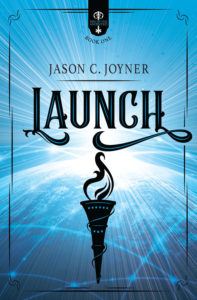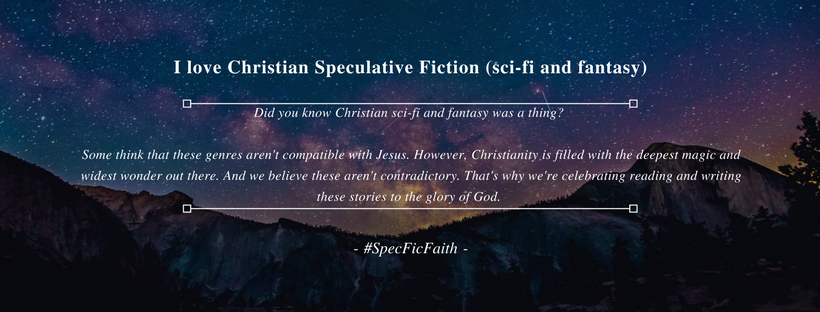
by Jason Joyner | Jun 4, 2018 | #specficfaith, Blog
Do you feel like it is the summer of superheroes?
I sure do. It got an early start with Avengers: Infinity War coming to theaters in late April. Even though I won’t watch  Deadpool, that’s another movie that just released. Han Solo may not have the Force, but he’s got the scoundrel’s luck to propel him to his own stand-alone Star Wars movie. Then we’ve got another Marvel movie in Ant-Man and the Wasp in July. The best Pixar movie finally gets a sequel when The Incredibles 2 hits theaters this month.
Deadpool, that’s another movie that just released. Han Solo may not have the Force, but he’s got the scoundrel’s luck to propel him to his own stand-alone Star Wars movie. Then we’ve got another Marvel movie in Ant-Man and the Wasp in July. The best Pixar movie finally gets a sequel when The Incredibles 2 hits theaters this month.
That’s just in the cinema. This week a new comic book based show opens on Freeform, Cloak and Dagger, developed from a cult favorite Marvel duo. There’s still all the superhero shows on The CW and Agents of SHIELD as well.
Oh, and there’s a book coming out that has superpowered teens. More about that in a minute…

Pop culture has exploded with superheroes. Special effects have finally caught up to the imaginations of comic book artists and writers. Instead of a buff Lou Ferrigno in green body paint in the 70s (Google the original Incredible Hulk), we have gods like Thor and Wonder Woman running around with guys bit by spiders and men dressing up as a bat accompanied by graphics that do justice to the source material. The explosion of movies, TV shows, and cross marketing with video games, Pop Funkos, and other products have caused us to be inundated with these costumed crusaders.
Is it too much?
I hope not, because I have a book coming out on July 3rd, my debut YA superhero novel called Launch. It deals with teens who develop special abilities who are gathered at a special conference hosted by a tech billionaire – a man with his own gifts and a desire to change the world with the teens he’s invited.
Maybe I have good timing. I have an easy opportunity to cross-promote my book with all these superhero properties coming out.
Then again, is there going to be superhero fatigue? Are people getting tired of these different heroes in colorful costumes?
The Cloak and Dagger series interests me because, like the show and its comic book source material, my book has a blonde girl and African-American male as my protagonists, and even some of the powers seem similar at first glance.
What does a writer do?
I can’t help but think that the timing is not by accident. I’m not going to worry about too many capes, or similarities to other properties out there. The Teacher in Ecclesiastes said that there was nothing new under the sun. Experts in writing and creativity note this as well – we aren’t writing new stories. We’re taking things we like from other tales, putting our spin on them, and putting them out there for audiences to enjoy.

I like my story. It’s got adventure, geeky references, fun characters, high stakes, and hints of romance. Anything from Indiana Jones to comic book heroes to Doctor Who influenced me in writing it. So if a literary take on the world of superpowers sounds intriguing to you, I hope you’ll give Launch a chance on July 3rd.
As far as I know, there’s no new movie releasing that day…

by Jason Joyner | Jan 23, 2018 | #specficfaith, Blog, Uncategorized
 Why do I read Christian speculative fiction?
Why do I read Christian speculative fiction?
I’ve always loved stories. As a kid I would daydream about being the hero and saving the day. I created scenarios with my G.I. Joes and Star Wars figures, making up adventures where the good guys struggled and prevailed. I also grew up on superheroes and comic books. The idea of special abilities appealed to me, a boy who was usually the youngest and smallest in my classes. What if I had a power that no one could see?
Some people think that there’s no place for fantasy or science fiction with a Christian worldview. The idea of magic is conflated with the idea of the prohibition of witchcraft in the Old Testament. Science fiction could be construed as going against God’s plan. Why would we go to the stars if the rapture is coming soon?
I read all sorts of stories as long as they’re well-told, but I do particularly enjoy when I can read a well-written story from a Christian perspective or with that moral foundation to it. I believe that there can be a seamless blend of a Christian worldview along with exciting stories of far-flung lands or distant worlds.
Fantasy can offer a clear view of good and evil—or it can explore the greys and the challenges in staying pure. A story can have a theme of sacrifice or perseverance that enhances those Biblical ideals without getting preachy about it. I believe magic can be used in stories if the consequences are reflected as well. The Chronicles of Narnia use the idea of a Deeper Magic that reflects the underlying power of God in creation, something greater than the White Witch’s power.
Science fiction has long been able to offer a critique of society and its priorities. Classics like Fahrenheit 451 warn of a future where books are forbidden. Why can’t a Christian be able to use such settings to speak prophetic truth to a world in need of change?
I believe that as long as a work of fiction doesn’t glorify what the Bible calls evil, it can be used to reflect his light and truth, whether allegorically, directly, or indirectly. There is room for quality stories that echo Christian principles. I am convinced that there is a place and a need for these stories.
As C.S. Lewis so eloquently said, “I thought I saw how stories of this kind could steal past a certain inhibition which had paralyzed much of my own religion in childhood. Why did one find it so hard to feel as one was told one ought to feel about God or about the sufferings of Christ? I thought the chief reason was that one was told one ought to. An obligation to feel can freeze feelings. And reverence itself did harm. The whole subject was associated with lowered voices; almost as if it were something medical. But supposing that by casting all these things into an imaginary world, stripping them of their stained-glass and Sunday school associations, one could make them for the first time appear in their real potency? Could one not thus steal past those watchful dragons? I thought one could.”
So today I’m joining with other fans of Christian speculative fiction to celebrate the stories. There are some great resources out there to help you find and enjoy these type of tales.
I just will share two today. Enclave Publishing is the premier publisher of Christian speculative fiction, although other houses are producing great books too. Then check out Speculative Faith/Lorehaven for a great resource building community for fans.
I’m passionate about seeing these stories get wider awareness. Look on Twitter for the hashtag #SpecFicFaith to see more people posting about this. I’ll leave you with another classic quote from G.K. Chesterton:
“Fairy tales do not tell children the dragons exist. Children already know that dragons exist. Fairy tales tell children the dragons can be killed.”

 Deadpool, that’s another movie that just released. Han Solo may not have the Force, but he’s got the scoundrel’s luck to propel him to his own stand-alone Star Wars movie. Then we’ve got another Marvel movie in Ant-Man and the Wasp in July. The best Pixar movie finally gets a sequel when The Incredibles 2 hits theaters this month.
Deadpool, that’s another movie that just released. Han Solo may not have the Force, but he’s got the scoundrel’s luck to propel him to his own stand-alone Star Wars movie. Then we’ve got another Marvel movie in Ant-Man and the Wasp in July. The best Pixar movie finally gets a sequel when The Incredibles 2 hits theaters this month.

